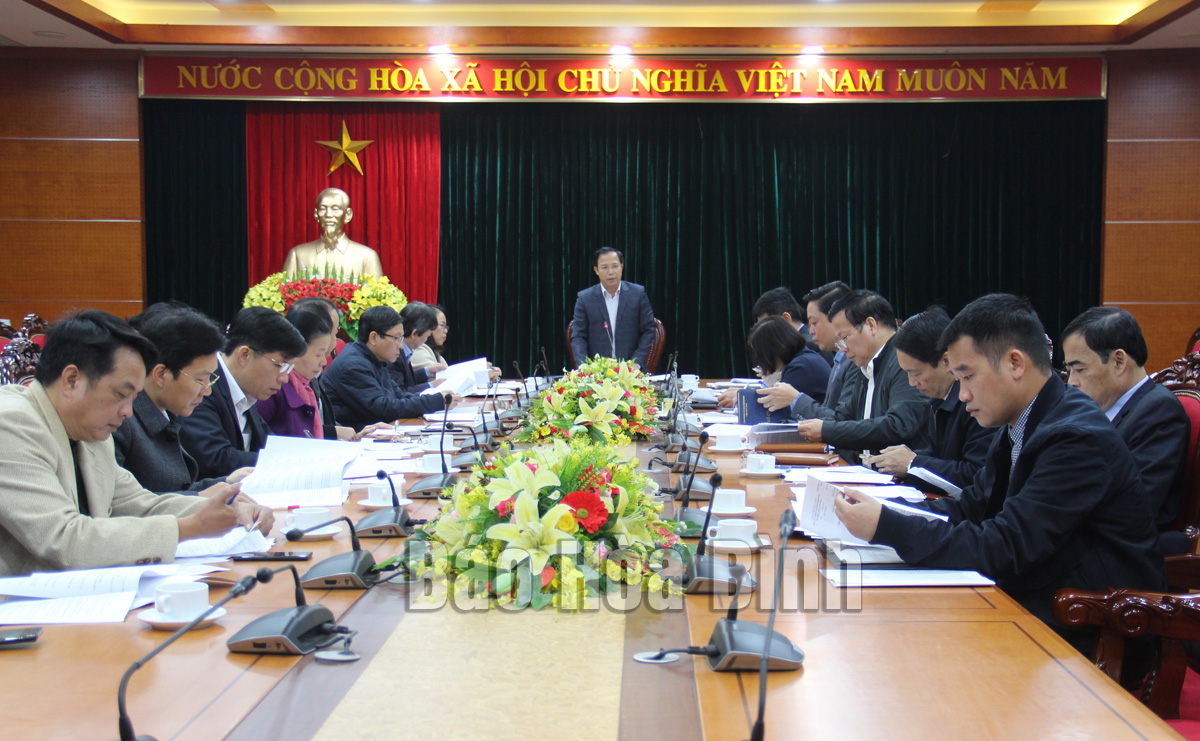
(HBO) – The Hoa Binh provincial People’s Committee has convened a meeting to discuss the preparations for the Khai ha Muong Bi Festival 2023. Vice Chairman of the administration Nguyen Van Toan, who is also head of the festival organising committee, chaired the session.
Vice Chairman of the provincial People’s Committee
Nguyen Van Toan addresses the meeting.
As 2023 marks 20 years since the restoration of
the Khai ha Muong Bi Festival in Tan Lac district, the coming event will be
held at the provincial level. The festival is scheduled to take place with
rituals and festivities from January 27 to 29, which is from the sixth to
eighth day of the first lunar month,. In particular, rituals will be performed
at the shrine of Luy Ai hamlet, Phong Phu commune. Festivities on January 27
and 28 will feature various activities such as sports competitions, folk games,
the Muong Bi night market, an exhibition of typical products of localities and
participating units across the province, a folk singing contest, performances
of traditional musical instruments, and a show of the Muong ethnic group’s
costumes.
The festival opening ceremony will be held at
the stadium of Phong Phu commune on January 29 and broadcast live on the Hoa
Binh Radio and Television Station and the online Hoa Binh Newspaper.
At the meeting, officials looked into such
issues as the guests to be invited to the opening ceremony, the making of a
detailed organisation plan, the assignment of tasks to members of the
organising committee, the establishment of sub-committees, and participants in
folk games.
Speaking at the session, Vice Chairman of the
provincial People’s Committee Nguyen Van Toan said the People’s Committee of
Tan Lac district, which is the standing body of the organising committee, and
departments and sectors need to actively work with one another to complete a
detailed plan on the holding of the festival as soon as possible. They need to
set up sub-committees and assigned concrete tasks to relevant parties. In
particular, it is necessary to frequently report to the provincial People’s
Committee so as to take timely actions.
He demanded infrastructure preparations for the
festival be finished soon to ensure safety and meet organisation requirements,
environmental hygiene given due attention, and communications increased before
and during the festival to attract visitors.
As a heavy workload needs to be done before the
festival takes place, the standing body and relevant units should quickly
perform their duties to ensure that all preparations are completed before the
Lunar New Year holiday, according to the official./.
Phong Phu commune, Tan Lac district of Hoa Binh province, is widely regarded as the cultural heartland of the Muong ethnic group. Among its many traditional communities, Luy Ai hamlet (formerly Ai hamlet) stands out as a rare location where the customs and way of life of the Muong Bi people remain largely intact.
The Truong Kha temple festival, a distinctive cultural event held every three years in Vu Ban township, Lac Son district, returned recently with vibrant rituals and folk traditions of the Muong people. Located next to the Buoi River in the Muong Trao fields, the Truong Kha Temple is dedicated to the three Kun Dol deities, revered for teaching farming techniques, irrigation, weaving, and protecting the harvest.
The demand for spaces serving community activities of residents in various areas across Hoa Binh city has been satisfied as local cultural houses now feature modern, spacious facilities thanks to the effective implementation of Resolution No. 49/NQ-HDND issued on December 28, 2021 by the city People's Council, which approved the plan for reorganising, converting, and allocating land for the construction, repair, and expansion of cultural houses in Hoa Binh’s villages and residential areas until 2025.
At the end of May, the Hoa Binh Provincial Ethnic Arts Troupe organized a series of performances for residents in Region 2 and Region 3 communes across the province. Bringing art to ethnic communities in remote, isolated, and especially disadvantaged areas has become a meaningful activity. These are not merely artistic performances but also journeys to disseminate cultural values, enrich spiritual life, and contribute to preserving the cultural identity of ethnic minorities.



